python 笔记 size-constrained-clustering (对类别大小做限制的聚类问题)
Posted UQI-LIUWJ
tags:
篇首语:本文由小常识网(cha138.com)小编为大家整理,主要介绍了python 笔记 size-constrained-clustering (对类别大小做限制的聚类问题)相关的知识,希望对你有一定的参考价值。
大小限制的聚类问题
1 主要方法
# 导入库
from size_constrained_clustering import fcm, equal, minmax, shrinkage,da
# by default it is euclidean distance, but can select others
from sklearn.metrics.pairwise import haversine_distances
from sklearn.datasets import make_blobs
import numpy as np
import matplotlib.pyplot as plt1.1 Fuzzy C-means Algorithm
和KMeans类似,不过利用了归属概率(membership probability)进行计算,而不是直接的0或者1
n_samples = 2000
n_clusters = 4
centers = [(-5, -5), (0, 0), (5, 5), (7, 10)]
X, _ = make_blobs(n_samples=n_samples, n_features=2, cluster_std=1.0,
centers=centers, shuffle=False, random_state=42)
#生成数据集,每个主句两个特征值,一共2000个样本,四个分类,同时设定了聚类中心点的位置
model = fcm.FCM(n_clusters)
# use other distance function: e.g. haversine distance
# model = fcm.FCM(n_clusters, distance_func=haversine_distances)
model.fit(X)
centers = model.cluster_centers_
'''
array([[ 0.06913083, 0.07352352],
[-5.01038079, -4.98275774],
[ 6.99974221, 10.01169349],
[ 4.98686053, 5.0026792 ]])
模型拟合之后,样本聚类的中心点
'''
labels = model.labels_
#模型拟合后,每个样本的类别
plt.figure(figsize=(10,10))
colors=['red','green','blue','yellow']
for i,color in enumerate(colors):
color_tmp=np.where(labels==i)[0]
plt.scatter(X[color_tmp,0],X[color_tmp,1],c=color,label=i)
plt.legend()
plt.scatter(centers[:,0],centers[:,1],s=1000,c='black')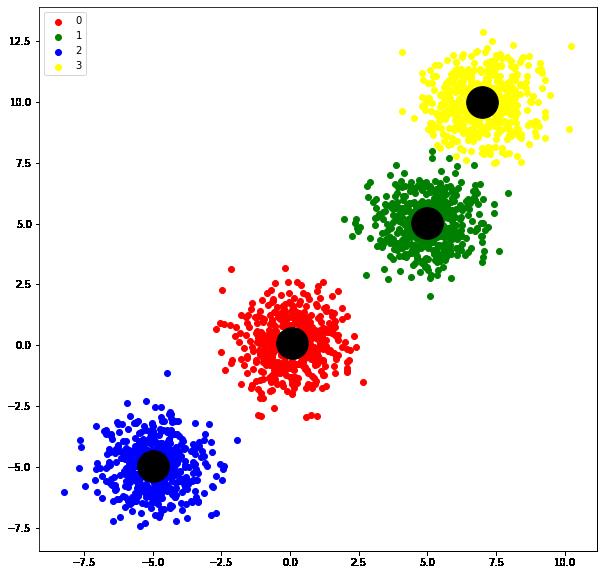
1. 2 Same Size Contrained KMeans Heuristics
利用启发式的方法获取等大聚类结果
n_samples = 2000
n_clusters = 4
X = np.random.rand(n_samples, 2)
# use minimum cost flow framework to solve
model = equal.SameSizeKMeansHeuristics(n_clusters)
model.fit(X)
centers = model.cluster_centers_
labels = model.labels_import matplotlib.pyplot as plt
plt.figure(figsize=(10,10))
colors=['red','green','blue','yellow']
for i,color in enumerate(colors):
color_tmp=np.where(labels==i)[0]
plt.scatter(X[color_tmp,0],X[color_tmp,1],c=color,label=i)
plt.legend()
plt.scatter(centers[:,0],centers[:,1],s=1000,c='black')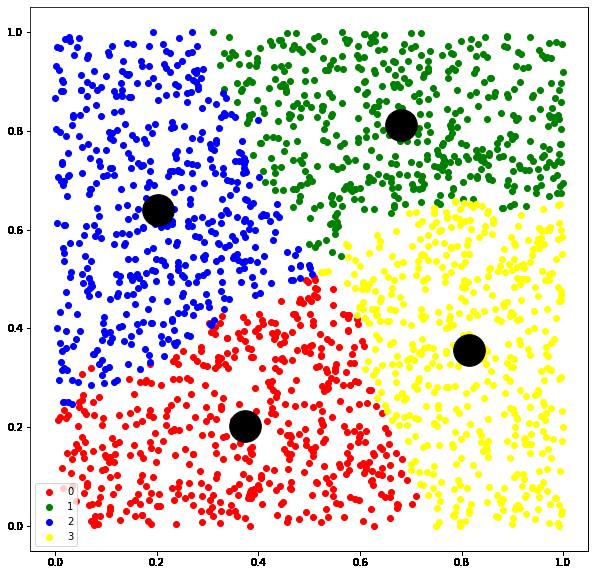
1.3 Same Size Contrained KMeans Inspired by Minimum Cost Flow Problem:
将聚类转换为分配问题,并用最小费用流的思路进行求解
n_samples = 2000
n_clusters = 4
X = np.random.rand(n_samples, 2)
# use minimum cost flow framework to solve
model = equal.SameSizeKMeansMinCostFlow(n_clusters)
model.fit(X)
centers = model.cluster_centers_
labels = model.labels_plt.figure(figsize=(10,10))
colors=['red','green','blue','yellow']
for i,color in enumerate(colors):
color_tmp=np.where(labels==i)[0]
plt.scatter(X[color_tmp,0],X[color_tmp,1],c=color,label=i)
plt.legend()
plt.scatter(centers[:,0],centers[:,1],s=1000,c='black')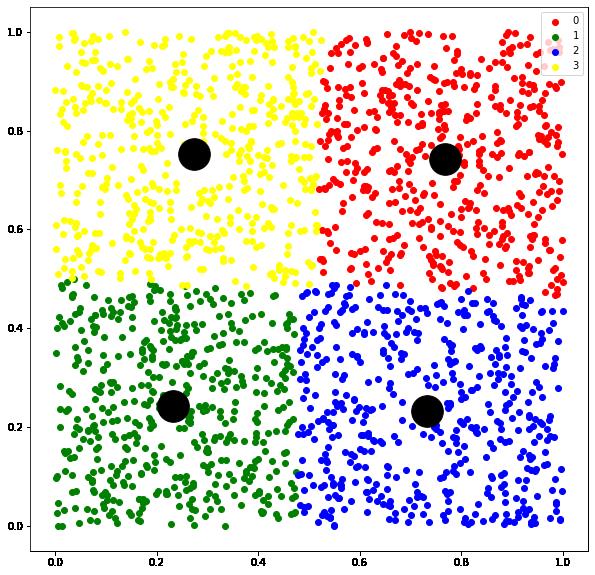
1.4 Minimum and Maximum Size Constrained KMeans Inspired by Minimum Cost Flow Problem
将聚类转换为分配问题,并用最小费用流的思路进行求解,加入最小和最大聚类规模限制
n_samples = 2000
n_clusters = 4
X = np.random.rand(n_samples, 2)
# use minimum cost flow framework to solve
model = minmax.MinMaxKMeansMinCostFlow(
n_clusters,
size_min=200,
size_max=800)
model.fit(X)
centers = model.cluster_centers_
labels = model.labels_
plt.figure(figsize=(10,10))
colors=['red','green','blue','yellow']
for i,color in enumerate(colors):
color_tmp=np.where(labels==i)[0]
plt.scatter(X[color_tmp,0],X[color_tmp,1],c=color,label=i)
plt.legend()
plt.scatter(centers[:,0],centers[:,1],s=1000,c='black')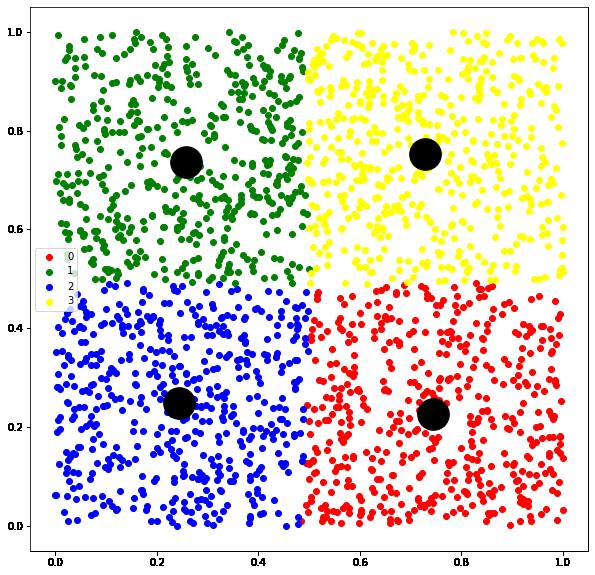
1.5 Deterministic Annealling Algorithm:
输入目标每类规模比例,获得相应聚类规模的结果。
n_samples = 2000
n_clusters = 4
X = np.random.rand(n_samples, 2)
# use minimum cost flow framework to solve
model = da.DeterministicAnnealing(
n_clusters,
distribution=[0.1, 0.2,0.4, 0.3])
model.fit(X)
centers = model.cluster_centers_
labels = model.labels_
plt.figure(figsize=(10,10))
colors=['red','green','blue','yellow']
for i,color in enumerate(colors):
color_tmp=np.where(labels==i)[0]
plt.scatter(X[color_tmp,0],X[color_tmp,1],c=color,label=i)
plt.legend()
plt.scatter(centers[:,0],centers[:,1],s=1000,c='black')
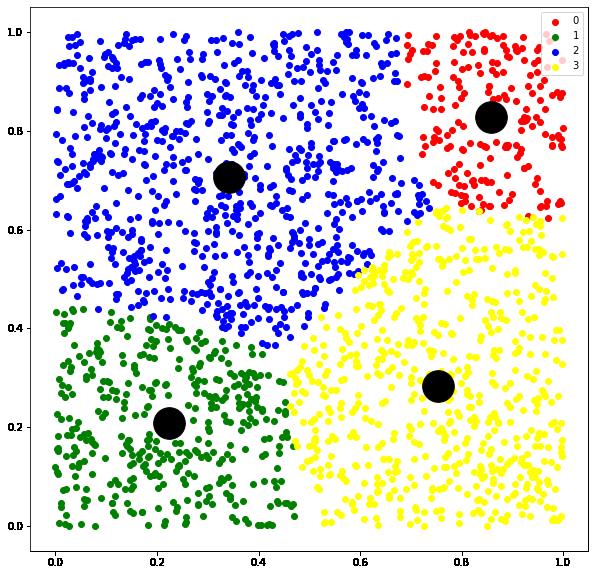
以上是关于python 笔记 size-constrained-clustering (对类别大小做限制的聚类问题)的主要内容,如果未能解决你的问题,请参考以下文章